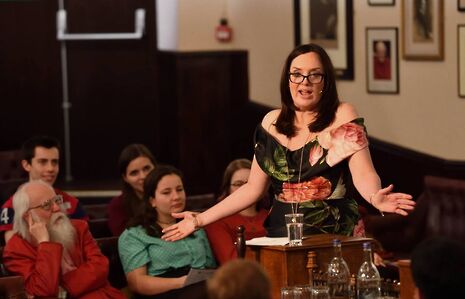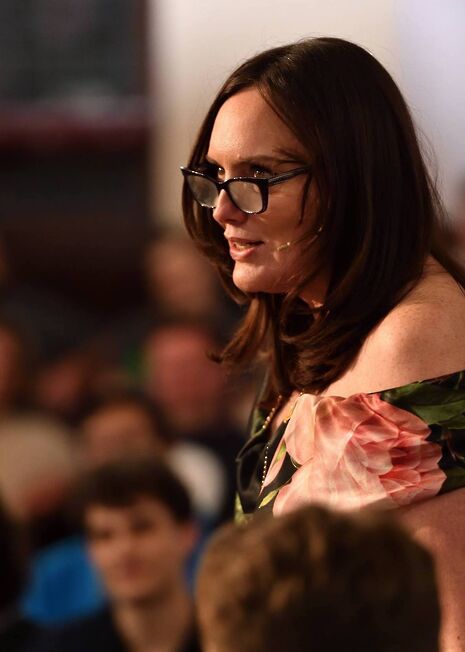Deborah Frances-White: ‘I’ve noticed that men often look a bit nervous’
Anna Jennings talks to the comedian and founder of The Guilty Feminist, Deborah Frances-White, about the podcast and the realities of feminism

Deborah Frances-White is best known as the co-creator and current host of popular podcast The Guilty Feminist, a show which tackles difficult feminist issues in good humour – very literally, with an abundance of clever comedy and high-profile guests. Deborah was in Cambridge to participate in a Union debate, and I talked to her afterwards about suffragettes, feminism today, and the patriarchal institution in which we found ourselves.
For anyone who’s listened to an episode of The Guilty Feminist (and if you haven’t, I strongly encourage you to), Deborah’s style of comedy is very distinctive. It’s clever, it’s witty, and it involves a lot of laughing at the problems of the patriarchy until they seem utterly unreasonable, and therefore untenable. She brought her particular brand of brashness in spades to the Union debating chamber, quickly filling the room with laughter of a particularly self-conscious kind, given that most of her humour is directed at the white male privilege abundant in the Union itself.
Deborah was superbly at home on the debating floor, so perhaps it’s no surprise that she stresses the importance of comedy and debate as a political tool. She talks of her recent epiphany while speaking at the Oxford Union: “I realised debates are a great way [forward] – because there’s a formality which means you’re allowed to come in a little bit harder in your comedy”. She speaks quickly, going over her words to get at a better clarity: “the formality of the debate procedure allows people to express their views in a more hyperbolic way, and we don’t feel we have to agree”.
“I’m a feminist but…”
Ever moving on to new projects – the upcoming musical Suffrageddon (more on that later) and her newer podcast Global Pillage, to name just a couple – Deborah explains that she is keen to start running comedy debates. What is refreshing is that unlike some more dogmatic feminist figures, Deborah Frances-White doesn’t proclaim to have all the answers: “I want to learn as much as I want to express my viewpoints,” she tells me.
One of the regular features of Deborah’s act is to single out a male audience member, and make comedy essentially out of making him feel uncomfortable. Fortunately, she does not disappoint, and brought this to the debate with panache. What I am more impressed by is her commandeering bravado in applying the same technique without the safety of a stage and a microphone. In the interview, a male reporter made the rookie error of asking why the show is called ’The Guilty Feminist’. She is quick to call him out for never listening to the podcast – “Have you heard it? I feel like you haven’t heard it?” – before going on to quite patiently explain the show’s opening premise.
“Let’s start rewarding and punishing the right behaviours”
What the whole ‘Guilty Feminist’ thing is about is exemplified by the show’s opening feature. Deborah and guests take turns to tell stories in the format ‘I’m a feminist but…’. One of my favourites is the all-too-relatable, “I’m a feminist but I just bought quite an expensive lipstick I really wanted on the grounds that the shade was called ‘Activist’.” One of the important takeaways of the show is to not see being a feminist as some kind of abstract ideal but to understand any feminist as, well, liable to marketing strategies and the patriarchy at times.
This kind of pragmatic, real feminism is demonstrated also in Deborah’s view on the current #MeToo campaign. She says “I think it’s working. I think it’s creating new structures, new architecture that protects women, and allows men to step back and go ‘hold on’, just because this has always happened doesn’t mean it’s right, and to understand what it’s been doing to women”. But she’s no idealist: “Other men are going ‘oh, it was more fun before, but I don’t want to ruin my career’. And I don’t really care why men stop groping women, sexually harassing them and sidelining them – I just want them to stop”.

Despite the serious subject matter, she still evokes laughs with her imitations of the voices of misogynist men. She concludes: “We give brownie points and carrots and sticks to all sorts of things, so let’s start rewarding and punishing the right behaviours.”
Founded with Sofie Hagen, The Guilty Feminist has enjoyed remarkable success since its inception in 2015. Deborah describes it as a kind of grassroots growth which means they have little need for advertising – “the right people find us”. What the show has been so successful in creating is a female-dominated space, in which women can be funny, clever, and speak their minds. Deborah elaborates: “It’s a micro-climate where women do well because the audience are hoping, wanting, expecting women to do well. And they project the same kind of glorious positivity that is routinely projected onto men at comedy clubs, men in the House of Commons, men in various spaces.”
The necessary flipside to this is that the men get sidelined. She explains: “I’ve noticed that men often look a bit nervous, they look like the one woman on a panel show if we have a man on. The audience is always very warm and delightful, but I notice that women take a more central space at The Guilty Feminist. They step into the light, they come towards the audience and it’s because it’s a micro-climate.”
“I notice that women take a more central space at The Guilty Feminist”
Describing this show as a “petri-dish”-like experiment, Deborah says that “we had no idea that it would become like this”. With over 28,000 Twitter followers, sold-out live audiences and its own Wikipedia page (no less), The Guilty Feminist now “is a place where women shine and the audience are hoping women do well. And women are safe now to speak and to say how they feel”.
But as much as it’s important to look forwards with feminism, Deborah is keen not to forget the roots of feminism, having recently hosting a ‘Suffragette Centenary Special’ with Guardian Live and making plans for the creation of Suffrageddon, a hip-hop musical designed to rival Hamilton. Why does this matter so much? “It matters because any movement needs to understand its history to understand where it had power, and where it excluded its most vulnerable members”. She continues, “we need to be looking at where we’re powerful, and where we’re at times accidentally excluding, or overlooking, or even just overtly not listing to members of our tribe”.
An Oxford English graduate herself, Deborah is big on emphasising her own forms of privilege. On white people, she declares “the best we can hope is that we get old and die before the rest of humanity gets sick of our shit and revolts,” finding an impressive amount of humour in such an absurdly nihilistic statement. She is also knowing about the different forms of generational privilege, reminding the largely undergraduate audience that “your best shot at real estate, young people, is to wait until your parents die”.
As she makes her way out of the room, someone stops to compliment her on her dress, a bold floral number. She stops to offer a final piece of life advice: “that’s the only thing you need when you get out of uni: one good Vivienne Westwood dress”.
 News / Caius mourns its tree-mendous loss23 December 2025
News / Caius mourns its tree-mendous loss23 December 2025 Comment / Yes, I’m brown – but I have more important things to say22 December 2025
Comment / Yes, I’m brown – but I have more important things to say22 December 2025 News / Clare Hall spent over £500k opposing busway 24 December 2025
News / Clare Hall spent over £500k opposing busway 24 December 2025 Interviews / Politics, your own way: Tilly Middlehurst on speaking out21 December 2025
Interviews / Politics, your own way: Tilly Middlehurst on speaking out21 December 2025 News / King appoints Peterhouse chaplain to Westminster Abbey22 December 2025
News / King appoints Peterhouse chaplain to Westminster Abbey22 December 2025








